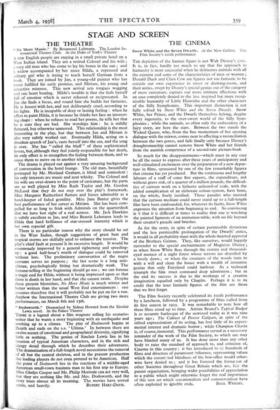STAGE AND SCREEN
THE THEATRE
4, No More Music." By Rosamond Lehmann The London In- ternational Theatre Club. At the Duke of York's Theatre A raw English people are staying in a small private hotel on a West Indian island. They are a retired Colonel and his wife ; a very old man who has come to lay his bones in the sun ; and a widow accompanied by her niece Hilda, a repressed and solitary girl who is trying to teach herself German from a book. They are joined by Jan, a young-old painter who has never fulfilled his early promise, and Miriam, his young and attractive mistress. This new arrival sets tongues wagging and one heart beating. Hilda's trouble is that she feels herself full of emotion which is never released or reciprocated. In Jan she finds a focus, and round him she builds her fantasies. He is honest with her, and not deliberately cruel, according to his lights. He is incapable of deep or lastink feeling : when he offers to paint Hilda, it is because he thinks her face an interest- ing shape : when he refuses to read her poems, he tells her that he is sure they are bad. She worships him : he is mildly flattered, but otherwise unmoved. This relationship is the most interesting in the play, but that between Jan and Miriam is also very subtly worked out. Eventually Hilda, acting on a drunken speech of Jan's, casts herself into the sea, and the song is over. She has " called the bluff " of these sophisticated lovers, but, although they feel jointly responsible for her death, its only effect is to strengthen the feeling between them, and to cause them to move on to another island.
The drama is played out against a very amusing background of conversation in the hotel lounge. The old man, beautifully portrayed by Mr. Morland Graham, is blind and somnolent : his only interests are music and neat whisky. The Colonel and his wife are over-drawn to the point of caricature, but the parts are so well played by Miss Ruth Taylor and Mr. Gordon McLeod that they do not step over the play's framework. Miss Margaret Rutherford flutters and fusses admirably as a hotel-keeper of faded gentility. Miss Jane Baxter gives the best performance of her career as Miriam. She has been com- pelled for so long to frisk with Admirals on the quarterdeck that we have lost sight of a real actress. Mr. Jack Hawkins is subtly excellent as Jan, and Miss Beatrix Lehmann lends to Hilda that hard brilliance of star-crossed intensity which is her own especial gift.
There is no particular reason why the story should be set in the West Indies, though suggestions of great heat and tropical storms are skilfully used to enhance the tension. The play's chief fault at present is its excessive length. It would be enormously improved by a general tightening and speeding- up : a good half-hour's worth of dialogue could be removed without loss. The preliminary conversation of the negro servants serves no purpose ; the last scene is a long anti- climax, psychologically fitting but dramatically weak. The fortune-telling at the beginning should go too ; we can foresee a tragic end for Hilda, without it being impressed upon us that there is death in her hand, and that she cannot swim. Despite these present blemishes, No More Music is much wittier and better written than the usual West End entertainment : one assumes therefore that it will probably not be put on for a run. Anyhow the International Theatre Club are giving two more performances, on March 6th and .13th.
" Dodsworth." Dramatised by Sidney Howard from the Sinclair Lewis novel. At the Palace Theatre
THERE is a legend about a film magnate telling his scenario- writer that he wants a story beginning with an earthquake and working up to a climax The play of Dodsworth begins at Zenith and ends on the s.s. Ultima.' In between there are twelve scenes of emotional and geographical diversity, signifying little or nothing. The genius. of Sinclair Lewis lies in his creation of typical American characters, and in the rich and slangy detail through which he describes their adventures. The dramatisation of a full-length novel necessitates the removal of all but the central skeleton, and in the present production the leading players do not even pretend to be American. Half the point of Dodsworth lies in the reactions of a middle-aged American small-town business man to his first trip to Europe. Miss Gladys Cooper and Mr. Philip Merivale can act very well, but they are nothing like Mr. and Mrs. Dodsworth, and the story loses almost all its meaning The movies have scored






































































 Previous page
Previous page